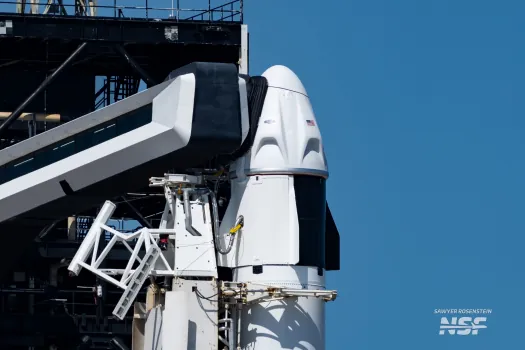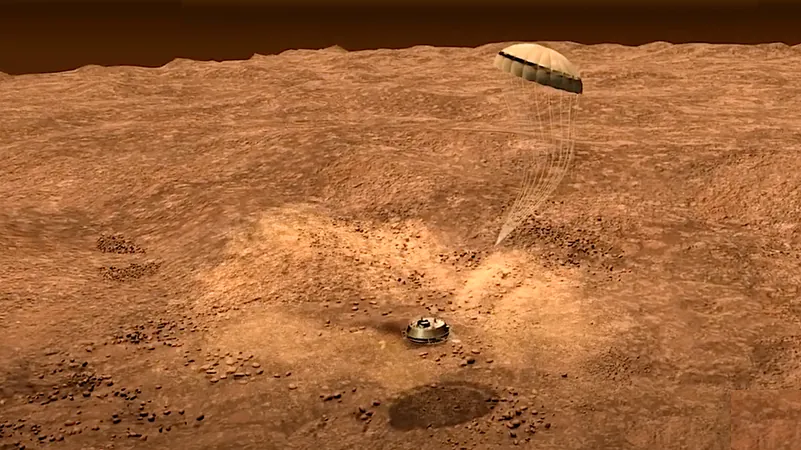
SpaceX's Revolutionary Fram2 Mission Set to Launch Into Historic Polar Orbit
2025-03-31
Author: Daniel
In a groundbreaking achievement for commercial space exploration, SpaceX is preparing to launch its highly anticipated Fram2 mission, marking the first-ever human spaceflight to achieve a polar orbit. Scheduled for liftoff from Kennedy Space Center in Florida on Monday, March 31, at 9:46 PM EDT, the mission will utilize the Falcon 9 rocket and the Crew Dragon Resilience spacecraft to carry a diverse crew of civilian scientists, entrepreneurs, and adventurers.
The launch window has been closely monitored by SpaceX teams, with backup options available should any delays occur, including opportunities at 11:20 PM EDT, 12:53 AM EDT, and 2:26 AM EDT.
Historic Mission Details
Once in orbit, the Fram2 crew will make history as the first humans to enter a 90-degree inclined polar orbit, providing them with a unique vantage point to observe Earth's incoming auroras and poles. Previously, the closest any humans have come to such a polar orbit was during the Soviet Voskhod 2 mission in 1965.
The crew includes:
- **Chun Wang**: The mission's commander, a Maltese entrepreneur and cryptocurrency investor known for co-founding mining pools F2Pool and Stakefish.
- **Jannicke Mikkelsen**: The vehicle commander, a Norwegian filmmaker noted for her expertise in filming in extreme environments. Mikkelsen previously participated in a record-breaking polar circumnavigation mission and will be the first European astronaut to command a spacecraft.
- **Rabea Rogge**: The pilot and a German robotics engineer, Rogge is set to become the first female German astronaut, contributing her knowledge from leading satellite and robotic ocean missions.
- **Eric Phillips**: The mission specialist and medical officer, an Australian polar explorer with significant experience in both Arctic and Antarctic expeditions.
The Fram2 mission will conduct 22 scientific experiments over its four-day duration, including:
- **SpaceXray**: The first-ever X-ray imaging of humans from space.
- **MushVroom**: A project to cultivate mushrooms in microgravity.
- **Blood Flow Restriction Study**: Assessing the impact of microgravity on muscle and bone health.
- **Motion Sickness Study**: Characterizing the effects of microgravity on astronaut health.
- **Hormona Test**: Investigating the impacts of microgravity on women’s reproductive health.
Technological Innovations and Launch Preparations
Crew Dragon Resilience has been retrofitted for this mission, including modifications made during its previous flights, enhancing its capabilities for this unique challenge. Resilience’s fourth flight sees it return after supporting missions like Inspiration4 and NASA's Crew-1.
As the countdown to launch approaches, the crew has undergone extensive training and simulation exercises, including a successful static fire of the Falcon 9 rocket without crew onboard. The launch will occur from Launch Complex 39A, where the team will don their pressure suits and make their way to the rocket just before the historic launch.
The Falcon 9 booster B1085 will execute its landing aboard the autonomous droneship "A Shortfall of Gravitas" after serving its crucial launch phase, continuing SpaceX’s tradition of reusable rocket technology.
The Legacy of Fram and What’s Next
Named after the legendary Norwegian polar exploration ship, Fram, the mission symbolizes humanity's spirit of adventure and scientific inquiry. After the successful completion of Fram2, Resilience is expected to splash down in the Pacific Ocean, marking a first for the Dragon spacecraft family.
Chun Wang, mission commander, expressed the crew's excitement: “We are honored to continue the legacy of Fram in an exciting era of commercial exploration. Our journey will not only change the landscapes of space travel but will also contribute significantly to ongoing research aimed at advancing our capabilities for long-duration space missions to destinations like the Moon and Mars.”
Prepare for a historical launch that promises to redefine our understanding of Earth's poles and the experiences of human life in space! Keep your eyes on the skies!



 Brasil (PT)
Brasil (PT)
 Canada (EN)
Canada (EN)
 Chile (ES)
Chile (ES)
 Česko (CS)
Česko (CS)
 대한민국 (KO)
대한민국 (KO)
 España (ES)
España (ES)
 France (FR)
France (FR)
 Hong Kong (EN)
Hong Kong (EN)
 Italia (IT)
Italia (IT)
 日本 (JA)
日本 (JA)
 Magyarország (HU)
Magyarország (HU)
 Norge (NO)
Norge (NO)
 Polska (PL)
Polska (PL)
 Schweiz (DE)
Schweiz (DE)
 Singapore (EN)
Singapore (EN)
 Sverige (SV)
Sverige (SV)
 Suomi (FI)
Suomi (FI)
 Türkiye (TR)
Türkiye (TR)
 الإمارات العربية المتحدة (AR)
الإمارات العربية المتحدة (AR)